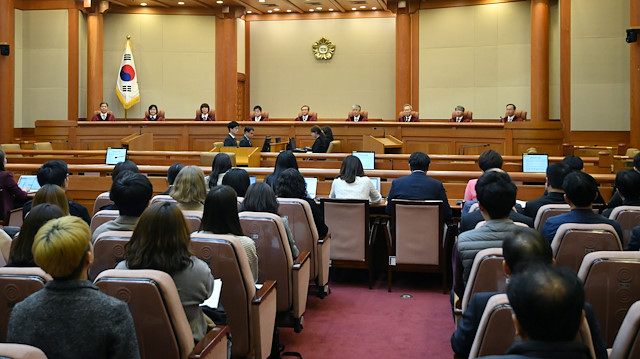
Constitutional Court of South Korea turns down petition by Korean sex slaves to review 2015 deal on wartime issues
The Constitutional Court of South Korea Friday turned down a petition filed by Korean wartime sex slaves against the 2015 deal between Seoul and Tokyo, according to local media reports.
“The matter is not subject to its formal review,” observed the court while rejecting the petition, adding that the deal does not affect the claimants' right to seek compensation, Seoul-based Yonhap News Agency reported.
In 2016, 29 victims and 12 family members of surviving and deceased “comfort women” had petitioned the court against the 2015 deal on Japan's sexual enslavement of Korean victims during World War II.
It was the administration of former South Korean President Park Geun-hye that reached the agreement with Japan to "finally and irreversibly" resolve the issue of Korean victims forced to serve as sex slaves for Japanese troops during the war.
But the administration of incumbent President Moon Jae-in had in June 2018 asked the court to turn down the petition saying the “deal -- not a state-to-state treaty -- is not subject to a formal review by the Constitutional Court.”
Today’s decision came amid growing warmth between Seoul and Tokyo which witnessed strife in bilateral relations over the colonial past affecting the bilateral trade, as well.
Petitioners asked court whether the deal is constitutional, claiming that such an agreement “infringed on their basic rights.”
The agreement is a “political” one, the court said.
"Various assessments of the deal are in the realm of politics as it is the judgment of diplomatic policy to seek the solution of the history issue and continue cooperation between the two nations," it added.
The 2015 deal resulted in establishment of a foundation dedicated to supporting surviving victims for which Tokyo paid $9.1 million.
But the petitioners wanted Japan to take “legal responsibility for the atrocities.”
Early this year, the Moon administration disbanded the foundation while dismissing the deal as "seriously flawed", angering Tokyo which termed the move as “breach of the agreement.”
It was the second time that the South Korean Constitutional Court issued an adjudication over the issue of Japan's sex slavery.
Earlier, it was in 2011 that the court ruled that it was unconstitutional for Seoul to make no specific effort to settle the issue with Tokyo.
Hello, the comments you share on our site are a valuable resource for other users. Please respect other users and different opinions. Do not use rude, offensive, derogatory, or discriminatory language.
The floor is all yours.








